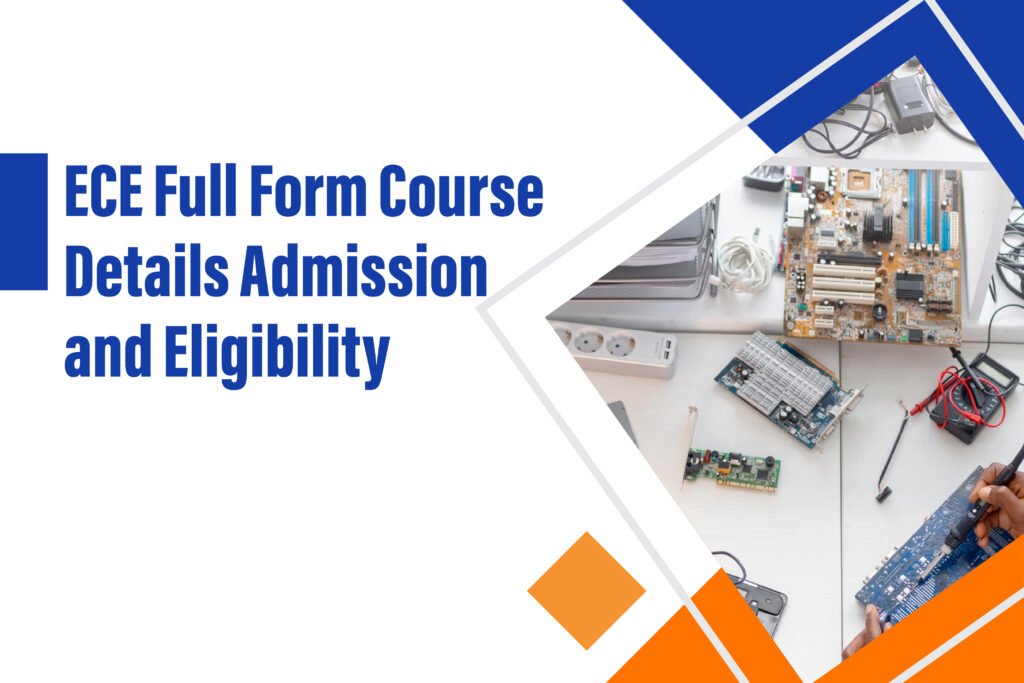
Introduction
If you’ve recently graduated from school and are wondering what to do next, or if you’re just curious about one of the most exciting fields of engineering, then let’s discuss ECE full form, its course information, admission procedure, and where it can lead you in the professional world.
What is ECE?
You might have wondered what is ECE engineering full form? Let’s begin with the basics: ECE is short for Electronics and Communication Engineering. It’s an engineering course that combines electronics, computer systems, and communication technologies.
Simply put, if you’re interested in how devices communicate with one another, such as mobile phones, satellites, or even your smart refrigerator, ECE could be the field for you!
This course is ideal for students who are technology-savvy, enjoy problem-solving, and wish to work on innovations that define the future. From creating circuits to working on communication protocols, there is a lot to discover.
Related: https://kce.ac.in/electronics-and-communication-engineering-a-detailed-guide-career-scope/
Course Duration and Structure
The ECE engineering course is most commonly provided as a B.Tech or BE course. The length of the undergraduate degree is 4 years, split into 8 semesters.
Over the course, you’ll have the opportunity to learn things such as digital electronics, microprocessors, signal processing, wireless communication, and many more. And, of course, there’s the practical labs and project work that assist you in putting your learning into practice.
You’ll also get exposure to trending technologies like IoT (Internet of Things), robotics, and embedded systems, making the course super relevant in today’s digital world.
Eligibility and Admission Process
So, how does one join an Electronics and Communication Engineering course?
For enrollment, students must have passed 10, +2 (or the equivalent) with Physics, Chemistry, and Math. Most of the colleges also demand a high score in exams like JEE, state-level engineering exams, or their university-based tests.
After you become qualified, the admission process typically involves counselling, document verification, and fee submission. Don’t worry—it may seem like a lot, but colleges tend to walk students through step by step, especially if you’re applying to the best college for electronics and communication engineering in Tamilnadu.
Fees and Affordability
When it comes to fees, the price is different for different colleges and places. The government colleges charge less, the fee being between ₹40,000 to ₹80,000 yearly. In private colleges, it reaches up to ₹2-3 lakhs per year.
However, there are several scholarships and financial aid schemes for deserving candidates, so the price should not hold you back if ECE is your passion.
Career Opportunities After ECE
Now comes the most exciting part job opportunities.
After completing your degree, there’s a wide range of career paths you can explore. You can work in industries like:
- Telecommunications
- Consumer Electronics
- IT and Software
- Embedded Systems
- Robotics
- Defense and Aerospace
Top recruiters include TCS, Infosys, Wipro, Qualcomm, DRDO, ISRO, Intel, and even startups.
ECE Graduates Can Work as:
- Network Engineers
- Embedded System Developers
- Communication Engineers
- Hardware Design Engineers
- IoT Specialists
If you’re still wondering what is ECE, think of it as a passport to both software and core electronics fields—flexible and future-ready!
Higher Studies and Other Options
Not all of us are eager to enter the job market immediately. Some of us prefer M.Tech or MS in specialized areas of VLSI, Signal Processing, or Communication Systems.
You may also opt for management courses (such as MBA) or for government exams (GATE, IES, or PSU recruitments). Furthermore, if research or teaching is your passion, then academia might be your destination.
Related: https://kce.ac.in/top-engineering-specializations-after-12th/
Why Choose ECE?
Still not convinced? Let’s break down a few more reasons:
- It offers the flexibility—core + software jobs.
- ECE keeps evolving with tech trends like 5G, AI, and smart systems.
- It combines theory, hands-on skills, and innovation.
- ECE engineers are in demand globally.
Unlike a few niche branches, this one gives you room to switch tracks later in your career, which is a big plus.
Conclusion
ECE, or Electronics and Communication Engineering, is a dynamic and versatile field that blends innovation with practical application. From cutting-edge tech roles to opportunities in government sectors, the career scope is vast.
Whether you’re planning for a job or higher studies, ECE keeps your future open and flexible. With the right guidance and dedication, success in ECE is well within reach. If you’re passionate about technology and communication, ECE could be the perfect path for you.
Quick FAQs
Q: Is ECE tougher than other branches?
A: Like any engineering course, it has its challenges. But if you’re interested in electronics or communication tech, it becomes a lot easier to enjoy.
Q: Can ECE students go into IT?
A: Absolutely. Many ECE students work in software companies thanks to their programming and logic skills.
Q: What’s the average starting salary?
A: Freshers can expect ₹3–6 LPA depending on the company, skills, and location. With experience, this can grow significantly
ECE is an excellent option if you are interested in a future-proof, versatile, and stimulating career. If your aspiration is to design technologies of the future or just secure a stable, high-paying career, ECE has lots of doors open.
Therefore, if you’re still trying to figure out your choices after school, this could be your cue to seriously think about ECE as your next career leap.
About Karpagam College of Engineering
Karpagam College of Engineering (KCE), established in 2000, is an autonomous institution located in Coimbatore, Tamil Nadu. Affiliated with Anna University, KCE is accredited by the National Assessment and Accreditation Council (NAAC) with an ‘A++’ grade.
The college offers undergraduate and postgraduate programs in various engineering disciplines, including Civil, Mechanical, Computer Science, Electronics and Communication, and Electrical and Electronics Engineering.
The institution emphasizes industry collaboration, providing students with practical exposure and placement opportunities in reputable companies. KCE boasts modern infrastructure, including well-equipped laboratories, libraries, and facilities for sports and extracurricular activities, fostering a holistic learning environment.
